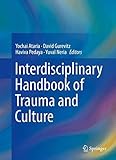Interdisciplinary handbook of trauma and culture /Yochai Ataria, David Gurevitz, Haviva Pedaya, Yuval Neria, editors.
Material type: TextPublication details: Switzerland : Springer, (c)2016.Description: 1 online resource (xvii, 399 pages) : illustrationsContent type:
TextPublication details: Switzerland : Springer, (c)2016.Description: 1 online resource (xvii, 399 pages) : illustrationsContent type: - text
- computer
- online resource
- 9783319294049
- 3319294040
- BF175 .I584 2016
- COPYRIGHT NOT covered - Click this link to request copyright permission: https://lib.ciu.edu/copyright-request-form
| Item type | Current library | Collection | Call number | URL | Status | Date due | Barcode | |
|---|---|---|---|---|---|---|---|---|
 Online Book (LOGIN USING YOUR MY CIU LOGIN AND PASSWORD)
Online Book (LOGIN USING YOUR MY CIU LOGIN AND PASSWORD)
|
G. Allen Fleece Library ONLINE | Non-fiction | BF175.5.75 (Browse shelf(Opens below)) | Link to resource | Available | ocn961873362 |
Introduction -- Part I: Representations of Trauma.-Trauma and Literature: The Postmodern Option -- Franz Kafka and Cormac Mccarthy -- Cultural Trauma and the Media -- Television: A Traumatic Culture -- Popular Trauma Culture: The Pain of Others Between Holocaust Tropes and Kitsch-Sentimental Melodrama -- The Trauma of Modernism: Between Existential Indeterminacy and Allegoresis -- Before Recognition: On the Aesthetics of Aftermath -- From Hiroshima to Fukushima: Comics and Animation as Subversive Agents of Memory in Japan -- Performative Recollection: Koizumi Meiro Representations of Kamikaze Pilots and the Trauma of Asia-Pacific War in Japan -- Architecture and Trauma -- Art as the Transport-Station of Trauma -- Part II: Theory of Trauma -- The Trauma of Philosophy -- Irresponsible Nonsense: An Epistemological and Ethical Critique of Postmodern Trauma Theory.-The Death of the Witness in the Era of Testimony: Primo Levi and Georges Perec -- Walking, Walking Out and Walking Through: Transitional Space and Traumatic Time -- Trauma and Monotheism: Sigmund Freud's Moses and Monotheism and the Possibility of Writing a Traumatic History of Religion -- The Crisis of Manhood -- Laius Complex and Shocks of Maternality: With Franz Kafka and Sylvia Plath -- Fear, Trauma, and Posttraumatic Stress Disorder: Clinical, Neurobiological, and Cultural Perspectives -- Part III: Case Studies of Collective Trauma -- Some Reflections on Transmitting the Memory of the Holocaust and its Implications, Particularly in Israel -- Placing Collective Trauma within its Social Context: the Case of 9/11 Attacks -- Masculinity, Spirituality, and Male Wartime Sexual Trauma -- Killing the Killer: Rampage and Gun Rights as a Syndrome -- Loss, Traumatic Bereavement and Mourning Culture: The Israel Example -- Fear and Silence in Burma and Indonesia: Comparing Two National Tragedies and Two Individual Outcomes of Trauma -- Conclusion: Trauma and Culture: How Trauma can Shape the Human Mind.
This lofty volume analyzes a circular cultural relationship; it not only explores how trauma is reflected in cultural processes and products, but also how trauma itself can shape literature, visual and performing arts, architecture, religion, and mythmaking. Analyses of American, Israeli, and Japanese art forms reveal the power of trauma, as reflected in varying roles of perpetrator, victim, and witness. Traumatic complexities are traced through the consideration of spirituality, religion, movement, philosophy, psychology, and trauma theory. Additionally, essays on authors such as Kafka, Plath, and Cormac McCarthy examine how narrative can blur the boundaries of personal and collective experience. Among the topics covered: Television: a traumatic culture. From Hiroshima to Fukushima: comics and animation as subversive agents of memory in Japan The difference between trauma and fear The death of the witness in the era of testimony: Primo Levi and Georges Perec. Sigmund Freud Moses and Monotheism and the possibility of writing a traumatic history of religion. Placing collective trauma within its social context: the case of the 9/11 attacks. Killing the killer: rampage and gun rights as a syndrome. This volume appeals to multiple readerships including researchers and clinicians, sociologists, anthropologists, historians, and media researchers.
Includes bibliographies and index.
COPYRIGHT NOT covered - Click this link to request copyright permission:
There are no comments on this title.
